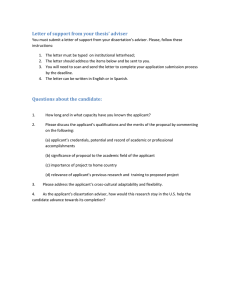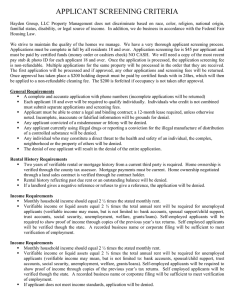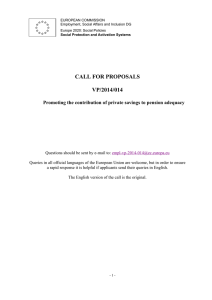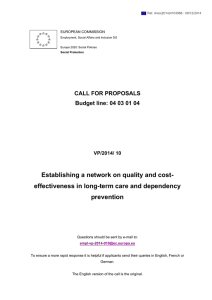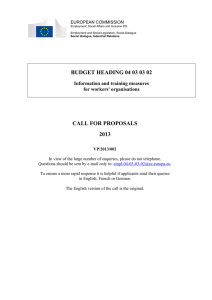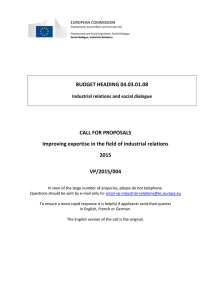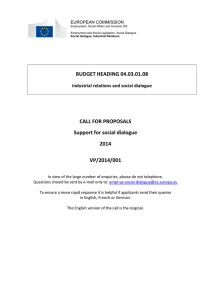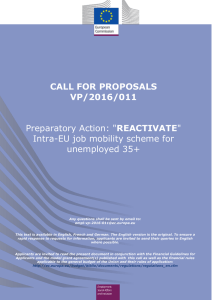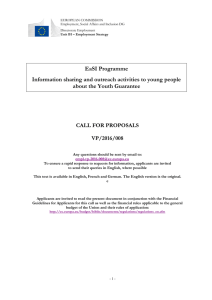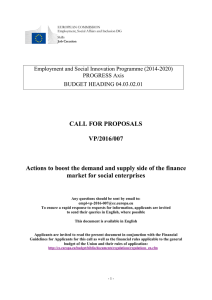EUROPEAN COMMISSION Employment, Social Affairs and
Anuncio
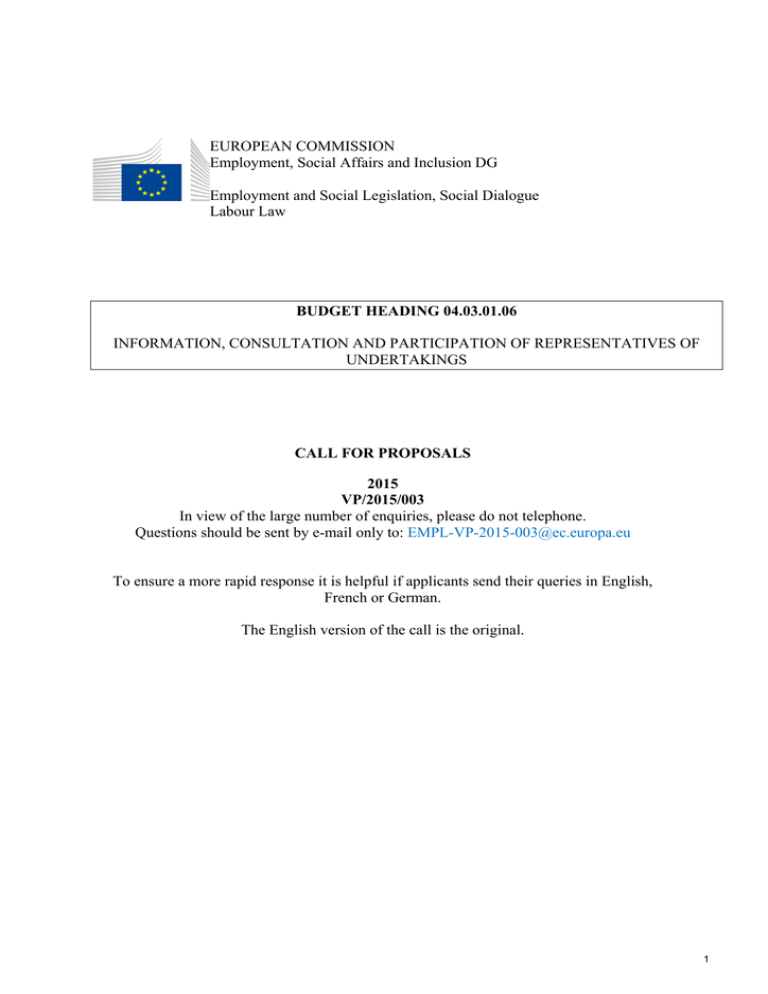
EUROPEAN COMMISSION Employment, Social Affairs and Inclusion DG Employment and Social Legislation, Social Dialogue Labour Law BUDGET HEADING 04.03.01.06 INFORMATION, CONSULTATION AND PARTICIPATION OF REPRESENTATIVES OF UNDERTAKINGS CALL FOR PROPOSALS 2015 VP/2015/003 In view of the large number of enquiries, please do not telephone. Questions should be sent by e-mail only to: EMPL-VP-2015-003@ec.europa.eu To ensure a more rapid response it is helpful if applicants send their queries in English, French or German. The English version of the call is the original. 1 TABLE OF CONTENTS 1. OBJECTIVES OF THIS CALL FOR PROPOSALS.................................................3 1.1 Priority objectives ..............................................................................................4 1.2 Eligible types of action ......................................................................................4 2. SUBMISSION OF GRANT APPLICATIONS ...........................................................5 2.1 Submission and implementation dates...............................................................5 2.2. Co-financing rate ...............................................................................................6 3 EXCLUSION CRITERIA..............................................................................................6 3.1 Eligibility criteria ...............................................................................................6 3.2. SELECTION CRITERIA ...............................................................................12 3.3. AWARD CRITERIA .......................................................................................13 4. PRACTICAL PROCEDURES ...................................................................................14 4.1. Where can the application form be found? ......................................................14 4.2. Where does the application need to be sent? ...................................................14 4.3. What next? Accepted and rejected applications ..............................................15 5. PUBLICITY .................................................................................................................16 2 BUDGET HEADING 04.03.01.06 INFORMATION, CONSULTATION AND PARTICIPATION OF REPRESENTATIVES OF UNDERTAKINGS 1. OBJECTIVES OF THIS CALL FOR PROPOSALS The purpose of this Call for Proposals is to fund operations aimed at developing employee involvement in undertakings - meaning any mechanism, including information, consultation and participation, through which employees' representatives may exercise an influence on decisions to be taken within the company - in particular by raising awareness and contributing to the application of EU law and policies in this area. EU law on employee involvement at transnational level includes Directive 2009/38/EC 1 on European works councils, Directives 2001/86/EC2 and 2003/72/EC3 on employee involvement in the European Company and the European Cooperative Society, respectively, and Article 16 of Directive 2005/56/EC4 on cross-border mergers of limited liability companies. EU law on employee involvement at national level includes Directive 2002/14/EC5 establishing a general framework for informing and consulting employees, directive 98/59/EC6 on collective redundancies and Directive 2001/23/EC7 on transfer of undertakings. Employee involvement is also fostered through the development of transnational company agreements8 between multinational companies and workers' representatives. In this context, the appropriations of this Call for Proposals finance measures enabling the social partners and the social actors at company level to familiarize themselves with EU law and policies in the area of employee involvement as well as to exercise their rights and their duties to this regard. They cover in particular funding of measures aimed at strengthening transnational co-operation between workers' and employers' representatives in respect of employee involvement. These appropriations may also be used to fund short training actions as well as actions involving representatives of social partners in the candidate countries9 in the field of employee involvement. The expected results of this call for proposals are improved possibilitites for the social partners to exercise their rights and duties as regards employee involvement; strenghtened 1 OJ L 122, 16/05/2009 OJ L 294, 10/11/2001 3 OJ L 207, 18/08/2003 4 OJ L 310, 25/11/2005 5 OJ L 80, 23/03/2002 6 OJ L225, 12/08/1998 7 OJ L 82, 23/03/2001 8 SEC(2008)2155 and COM(2005)33 9 Where reference is made to the Candidate Countries in this call for proposals, it concerns the Candidate Countries at the time of the deadline for the submission of applications of this call: http://ec.europa.eu/enlargement/countries/check-current-status/index_en.htm. 2 3 cooperation among social partners and other actors in respect to Union law on employee involvement; a follow up on the findings of the "Fitness check" on EU acts in the area of Information and Consultation of Workers, and increased number of social partners and other actors familiarised with transnational company agreements. Access for people with disabilities should be guaranteed for measures funded under this call for proposals. The budget authority has foreseen the amount of € 7 116 000 to be allocated to the present Call for Proposals for 2015. The Commission reserves the right not to distribute all the funds available. 1.1 Priority objectives For the financial year 2015 the following objectives may be supported under this Call for Proposals: a) to promote actions designed to prepare the setting up of transnational information, consultation and participation bodies and mechanisms arising from the application of EU law on employee involvement; b) to promote the exchange of information and good practice aimed at creating favourable conditions for the setting up of national information, consultation and participation bodies and mechanisms arising from the application of EU law on employee involvement; c) to promote action aiming to familiarize the social partners and actors at company level with the content of EU law on transnational employee involvement and to enable them to exercise their rights and their duties in this regard; d) to promote initiatives to strengthen transnational cooperation between workers' and employers' representatives in respect of information, consultation, and participation of employees within companies operating in more than one Member State; e) to promote transnational actions involving representatives of the new Member States and of Candidate Countries in the field of employee involvement; f) to promote action aiming to familiarize the actors represented at company level with transnational company agreements and to strengthen their cooperation within the European Union; g) to promote operations fostering the development of employee involvement in undertakings (also, when necessary, taking into account possible specific needs of employees with disabilities) as well as to follow up on the findings of the "Fitness check" on EU acts in the area of Information and Consultation of Workers; h) to promote innovative actions relating to employee involvement, with the view of supporting the anticipation of change and the prevention and resolution of disputes in the context of corporate restructuring, mergers, take-overs and relocation in Union scale undertakings and groups of undertakings; i) to strengthen cooperation between the social partners for the development of employee involvement in the design of solutions addressing the consequences of the economic crisis, such as collective redundancies, or the need for a shift towards an inclusive, sustainable, and low-carbon economy; 4 j) to develop expertise across Member States, promoting cooperation between relevant Authorities and stakeholders and fostering relations with the Union Institutions so as to support the implementation and improve the effectiveness of EU law on employee involvement. 1.2 Types of eligible activities are: A. Conferences, seminars, short training actions, manuals and exchange of information and of good practices involving workers' and/or employers' representatives; B. Analysis papers on quantitative, qualitative aspects and results on subjects related to workers' and employers' representation and social dialogue at undertaking level in a transnational cooperation context; C. Websites, publications, newsletters and other means for the dissemination of information. 2. ADMISSIBILITY CRITERIA 2.1 Submission and implementation dates 2.1.1. Respect of deadlines – Programming In view of the time needed to examine applications, actions may not start before the deadline given below. Applicants should note that if their project is approved, they will not necessarily receive the grant agreement prior to the action's starting date set by them and should, therefore, take this into account in programming of the timing of their project. Any expenditure incurred before signature of the grant agreement by both parties is at the applicant's risk. The Commission welcomes in particular projects that provide for a full project cycle, including preparatory, dissemination, implementation, follow-up and reporting activities. Therefore, the project's duration can be up to 24 months. Applicants are requested to pay particular attention to the establishment of a realistic project timetable in order to avoid requests for amendment of the grant agreement for the purpose of extending the project duration. Proposals which do not respect the provisions of point 2.1.1. and date of submission and date of starting as indicated at point 2.1.2. and/or do not comply with the rules indicated at point 4.2 hereinafter, will not be considered by the Evaluation Committee. 2.1.2. Deadline: The deadline for the submission of applications (and indicative amounts) is as follows: • 22 June 2015 for actions commencing no earlier than 15 October 2015 and no later than 31 December 2015 Applications not respecting this condition will not be considered. Please note that there is no second deadline for this call for proposals. 5 2.1.3. Evaluation Process An Evaluation Committee will examine the applications. Applications will be examined and selected taking account of the criteria laid down in this document. The partial or total withholding by the applicant of any information that may have an impact on the Commission's final decision concerning the application will entail the automatic disqualification of the application or, if discovered at a later stage, will entitle the Commission to terminate the agreement and demand the full repayment of all sums received by the beneficiary under it. 2.1.4. Information on the action for which the grant is requested When drafting the project proposal, applicants are invited to pay particular attention to the following elements: • The proposal should provide a clear explanation of the rationale and problem definition/analysis underpinning the proposed action, as well as the specific contribution of the action to the objectives of the call for proposals and its expected impact. • In case of recurrent related applications by the same applicant, the added value of the new project as compared to previous ones should be clearly explained. • The choice of partners involved and countries covered should be duly explained and justified as regards their relevance towards the specific objectives of the action. • Duplication between the SWIM application form and the "detailed work programme" should be avoided. • Cost estimates should be reasonable, justified and comply with the principle of sound financial management, in particular regarding economy and efficiency. It should be noted that the cost-effectiveness of actions will be evaluated on the basis of the proposed budget. The Commission reserves the right to make corrections and/or cut non-eligible expenditure from the proposed budget, but it will not make adjustments in order to improve cost-effectiveness of proposals. 2.2. Co-financing This budget heading allows support to be given to projects to which the applicants contribute at least 10 % of the total eligible costs of the action. Contributions in kind will not be taken into account. 2.2.1 The contribution to the project of at least 10% will be evidenced from the budget included in the application and, inter alia, through commitment letters stating the precise amount of financial cash contribution to the budget. 2.2.2 Any application which requests a grant of more than 90 % will be excluded automatically from the selection. 2.2.3 The grants shall be covered by a written grant agreement and the requested European Union funding per project will not be less than EUR 108.000. 6 3 EXCLUSION AND ELIGIBILITY CRITERIA 3.0 Exclusion criteria Applicants must be in conformity with Articles 106(1)10 and 107 to 109 of the Financial Regulation11. 3.1 Eligibility criteria 3.1.1. General rule of eligibility The budget heading is intended to finance specific transnational cooperation projects. Therefore grants are not intended to finance the normal operation or meetings of bodies representing management or labour (the social partners); they are intended only to cover additional expenditure linked directly to projects. 3.1.2. Eligible applicants 3.1.2.1 Applicants must be - Properly constituted and registered legal persons, having their registered office based in one of the Member States of the European Union. In derogation from this requirement and pursuant to Article 131 of the Financial Regulation, the organisations of social partners without legal personality under the applicable national law are also eligible provided that the conditions of the Financial Regulation12 related thereto are met. – Representatives of workers or employers based in one of the Member States of the European Union, such as: A) for workers: applicants may be works councils or similar bodies ensuring the general representation of workers; regional, national, European, sectoral or multi-sectoral trade unions based in one of the Member States of the European Union; B) for employers: applicants may be the management of undertakings, organisations representing employers at regional, national, European, sectoral or multi-sectoral level based in one of the Member States of the European Union. In case of commercial undertakings, the objective of the project must be non-commercial in nature. – As an exception, applicants may also be technical bodies such as non-profit training or research bodies and commercial companies only if the aim of the project is non-commercial. The above quoted technical bodies and commercial undertakings will be considered eligible 10 The situations referred to include bankruptcy, compulsory winding-up, being under court administration, in an arrangement with creditors or any other similar proceedings; convictions of professional misconduct; non-fulfilment of social security or tax payment obligations; convictions of fraud, corruption, involvement in a criminal organisation or any other illegal activity; declared in serious breach of contract in relation to activities funded by the EU budget; subject to conflict of interest; guilty of misrepresentation in supplying the required information. 11 Council Regulation (EC, Euratom) No 966/2012 of 25 October 2012 (OJ L298, 26 October 2012); http://ec.europa.eu/budget/biblio/documents/regulations/regulations_en.cfm. 12 Council Regulation (EC, Euratom) No 966/2012 of 25 October 2012 (OJ L298, 26 October 2012); http://ec.europa.eu/budget/biblio/documents/regulations/regulations_en.cfm 7 only where they are expressly mandated by one or more eligible organisations representing workers or employers of Member States and when a mandatory letter of endorsement is included. – Co-applicants must have their registered office in one of the Member States or Candidate Countries13. 3.1.2.2 In order to strengthen co-operation between workers' and employers' representatives in respect of information, consultation and participation within undertakings operating in more than one Member State, projects involving only one information and consultation body should be submitted as joint projects from representatives of workers and employers. 3.1.2.3 Where particular circumstances do not allow submitting such a joint project, the reasons must be specified in the application. 3.1.4. Eligible applications To be eligible, applications must: a) Be sent by the deadline indicated in section 2.1.2 (both electronic and paper version); b) Be submitted according to the requirements listed below and in accordance with the provisions requested at point 4.2 hereinafter; c) Be complete, detailed and include all the documents and elements indicated in the table below at point 3.1.4.1, as well as under the point 3.2 selection criteria as concerns in particular point 3.2.1 financial capacity and 3.2.2 operational capacity; 3.1.4.1 Applications lacking one or more of the documents and/or elements requested hereinafter will be considered not eligible and therefore will not be examined by the Evaluation Committee. 1 Official covering letter of the application: quoting the reference of the call for proposals, with the original signature of the lead applicant's legal representative. 2 Print-out of the duly completed and submitted on-line application form (https://webgate.ec.europa.eu/swim): dated and with the original signature of the lead applicant's legal representative. NOTE: The on-line form must be electronically submitted before printing. After the electronic submission no further changes to the application are possible. 3 13 A declaration on honour from the lead applicant and each co-applicant. This must follow the template provided and be written on the official letterhead paper of the applicant organisations and have the original signature of the legal representative, certifying that the applicant organisation is not in one of the situations listed in Articles 106(1) and 107 to 109 of the Financial Regulation and that it has the financial and operational capacity to complete the activity for which funding is requested. The same condition applies to affiliated entities – as do the other eligibility and non-exclusion criteria that apply to co-applicants. 8 4 A letter of mandate from each co-applicant. This must follow the template provided and be written on the official letterhead paper of the organisation, following the template provided and bearing the original signature of the legal representative. It must also be submitted electronically in annex to the on-line application form. 4a In case of applicants (lead or co-applicants) who are technical bodies such as nonprofit training or research bodies and commercial companies, a letter of mandate by one or more eligible organisations representing workers or employers of Member States is mandatory. 5 For each affiliated entity (if any), a document providing proof of the legal and /or capital link with the lead applicant or a co-applicant. 6 "Financial identification" form of the lead applicant organisation duly completed with the original signature of the account holder and the original signature and stamp of the bank. The financial identification form can be found at: http://ec.europa.eu/budget/contracts_grants/info_contracts/financial_id/financial_i d_en.cfm 7 ''Legal entity'' form of the lead applicant and each co-applicant duly completed with the original signature of the legal representative. The legal entity form can be found at: http://ec.europa.eu/budget/contracts_grants/info_contracts/legal_entities/legal_ent ities_en.cfm#en Applicants must also provide: • a copy of the certificate of official registration or other official document attesting to the establishment of the entity (where this exists); • a copy of the articles of association/statutes or equivalent, proving the eligibility of the organisation; • a copy of a document confirming the applicant's tax or VAT number, if available; • exclusively in the case of social partner organisations without legal personality, a signed letter of the legal representative certifying his/her capacity to undertake legal obligations on behalf of the organisation. Organisations from Candidate Countries are requested to provide a translation in English, French or German of the required documents. 9 8 A detailed work programme for the project. This is a separate document in addition to the on-line application form and it must also be submitted electronically in annex to the on-line application form. The paper version must be identical to the electronic version of the detailed work programme. • It should provide a detailed and structured overview of the different project activities, the foreseen timing and the role and responsibility of each partner organisation (not individual staff members) in the implementation of these activities, as well as, to the extent possible, draft agendas of the main project events. • Where appropriate, risk factors as regards implementation and/or impact of the activities should be identified and mitigating measures defined. • It offers an opportunity to develop further the rationale and problem analysis underpinning the action. All other information on the action should in principle be given in the SWIM application form. The detailed work programme is therefore expected not to be much longer than 5 pages, with an absolute maximum of 10 pages. The detailed work programme should be submitted in English, French or German. 10 9 A budget explanation for the project. This is a separate document in addition to the budget section of the on-line application form and it must also be submitted electronically in annex to the on-line application form. The paper version must be identical to the electronic version of the budget explanation. The budget explanation must provide additional information to explain and justify all items in the proposed budget. It should in particular explain: how the number of working days of staff involved in the implementation of the action has been fixed; how average travel costs were calculated; unless this is self-explanatory, how costs of services and administration costs were defined. The Commission may request applicants to submit additional justifications of proposed eligible costs during the evaluation procedure. The budget explanation should be submitted in English, French or German. 10 A list of the associated organisations and third parties involved in the action14 This is a separate document in addition to the budget section of the on-line application form and it must also be submitted electronically in annex to the online application form. The paper version must be identical to the electronic version of the budget explanation. For each of these organisations, the following information must be provided: • Name of the organisation • Type of involvement (i.e. as associate organisation or third party) • Type of organisation (see the options for applicants in the SWIM form) • Address • Postal code and city • Country The requested information should be submitted in English, French or German. 11 Letters of commitment A signed letter of commitment following the template provided from each coapplicant15 and affiliated entity named in the application form, and from any associate organisation or third party playing a major role in or making a financial contribution to the action, should be provided, explaining the nature of the partner's involvement and specifying the amounts of any funding provided. The letters of commitment should be submitted in English, French or German. 14 15 The co-applicants and affiliated entities are to be encoded separately in the SWIM form. Please seen Annex I to the call (Financial Guidelines for Applicants) for a definition of the terms co-applicants, affiliated entities, associate organisations and third parties Not required for the lead applicant. 11 12 A Curriculum vitae of the person responsible for managing the action (named in section A.3 of the application form) and of other persons undertaking major tasks indicating clearly the current employer(s) with whom there exists either a permanent or temporary contract of employment. The CV should be submitted in English, French or German. 13 In the case of subcontracting for external expertise, the completed form "Contracts for implementing the action" provided in the on-line application16. Applicants wishing to recruit the services of external experts must provide the detailed information regarding the tasks involved, the reasons for subcontracting these tasks, and the selection procedure that will be followed to award the contract17. The form should be submitted in English, French or German. Applicants should note that subcontracting external expertise is only admissible if the staff of the applicant organisations and affiliated entities do not have the skills required. It is not permissible to subcontract the project management of the action. 14 The most recent balance sheet of the lead applicant and all co-applicant organisations. The balance sheets, by definition, must include assets and liabilities. The applicants should specify which currency is being used in the balance sheet. The Commission reserves the right to request balance sheets from previous years, if necessary. Organisations that are not required by law to establish an official balance sheet must nevertheless provide information on their assets and liabilities. 15 Profit and loss accounts and balance sheet summary which must follow the template provided and must be signed by the legal representative of the applicant and all co-applicants which are not public bodies or international organisations. 16 For grant requests over EUR 750 000: an external audit report produced by an approved auditor, certifying the accounts of the applicant organisation for the last financial year available. In case of applications by a consortium, the threshold applies to each of the co-applicants in line with their share of the action budget. The external audit report should be submitted in English, French or German. 16 In this context, interpretation and translation tasks are not considered as external expertise. The general rules and principles regarding the conclusion of external contracts included in Annex I do nevertheless fully apply (e.g. the obligation for the beneficiary to "seek competitive tenders from potential contractors and award the contract in writing to the bid offering the best value for money"). 17 Where the value of the procurement contract exceeds EUR 60 000, the beneficiary, in addition, must provide a copy of the draft tender specifications. To assist applicants, a model for tender specifications is included in Annex II to this call. Important additional information concerning subcontracting can be found in Annex I. The draft tender specifications should be submitted in English, French or German. In addition, the applicants must be able to prove, if requested, that they have sought bids – by registered letter – from at least five different tenderers, including proof that they have posted the call for tender or invitation to tender at least on their website and provide a detailed description of the selection procedure. This requirement does not apply to public authorities which are already governed by a system of public procurement rules; however, where applicable, this should be indicated. 12 3.1.5. Eligibility of actions: To be eligible, actions must: • A. Comply with the rules related to dates of starting of the actions as stated in point 2.1.2; • B. Be linked to at least one of the priority objectives stated at point 1.1 above; • C. Be fully carried out in the Member States of the European Union or the Candidate Countries at the deadline for the submission of applications; • D. Comply with the rules on subcontracting and external expertise set out under point 13 in the table above; • E. Comply with the European Union co-financing percentage of maximum 90 % as set at point 2.2 above; • F. Have the involvement of co-applicants, affiliated entities or associate organisations18 from more than one Member State and/or Candidate Country in the case of proposals which are not submitted by a European-level19 workers' or employers' organisation. 3.1.6. Participants Participants in projects should be representatives of workers or employers from the Member States and Candidate Countries at the deadline for the submission of applications (i.e. members or future members of information, consultation and participation bodies; management of undertakings or groups or members of employers associations; officials of workers organisations/ trade union representatives; experts nominated by the eligible social partners mentioned at point 3.1.2.). 3.2. SELECTION CRITERIA The applicant (lead and co-applicants) must be able to demonstrate the financial and operational capacity to complete the activity for which funding is requested. Thus the applicant must have access to solid and adequate financial resources, which are not exclusively made up of European Union grants, to maintain activities for the period of the project and to help finance it as necessary and must have the operational resources (technical, management) needed to successfully complete the activity. Only organisations who demonstrate the necessary financial and operational capacity may be awarded a grant. 3.2.1 The financial capacity20 shall be proven, inter alia, by the annual balance sheet and declaration on honour. The verification of financial capacity will not apply to public bodies. 18 Please see Annex I to the call (Financial Guidelines for Applicants) for a definition of the terms coapplicants, affiliated entities and associate organisations. 19 For the purposes of this Call, "European-level organisation" means a legal entity, having its registered office based in one of the Member States of the European Union and ensuring the general representation at European level, of Member States workers' or employers' national associations and promoting their common interests at European level according to their own by laws. 20 The financial capacity of the applicant (lead and co-applicants) is assessed based on the analysis of the supporting documents listed in positions 2, 3, 14, and 15 in the table in section 3.1.3 "Eligible applications" and by calculating the ratio between the total assets in the applicant's balance sheet and the total budget of the project or the part of the project budget for which that organisation is responsible according to the budget in the 13 3.2.2. The applicants (lead applicant and co-applicants) must prove to have the operational resources (technical, management) and the professional skills and qualifications needed to successfully complete the proposed action, as well as the ability to implement it. Therefore in order to demonstrate operational capacity the applicant shall provide, inter alia: a) the declaration on honour mentioned above; b) the most recent activity report of the applicant's organisation (if available); c) an organisational chart showing the structure of the applicant's organisation with all members of staff involved in the project, their positions and employment status; d) for each co-applicant, associate organisation or third party involved in the project management the letter of commitment requested in section 3.1.4.1 point 11 as above including the full description of work and tasks to be carried out; e) a written declaration signed by the person quoted as responsible for managing the action in the Application form, certifying the professional competence of the team performing the tasks associated with the action for which funding is requested. This declaration shall be accompanied by their curriculum vitae. If the lead applicant is considered not to have the required financial or operational capacity, the application as a whole will be rejected. If a co-applicant is considered not to have the required financial or operational capacity, this co-applicant will be removed from the consortium and the application will be evaluated on that basis21. In addition, the costs in the budget that are allocated to the non-eligible co-applicant will be removed from the budget. If the application is accepted, the work programme will have to be adapted as appropriate. 3.3. AWARD CRITERIA Proposals which fulfil the eligibility and selection criteria indicated above will be assessed according to the following award criteria: i. The extent to which the action meets the objectives including the priority objectives of this Call for proposals; ii. The extent to which the project concerns innovative measures or new subjects in relation to information, consultation and participation of representatives of undertakings and which adds value to the existing situation; iii. The extent to which the project promotes the joint participation of employers and workers; iv. The extent to which the operation has a genuine transnational dimension; v. The extent to which workers' and/or employers' representatives from new Member States or Candidate Countries are actively involved in the project; vi. The cost-effectiveness of the action; vii. The overall quality, clarity and completeness of the proposal, including the budgetary aspects and the arrangements to publicise the operation, including aspects related to the European Union funding, and dissemination methods envisaged. application form (the ratio should be greater than 0.70). In addition, the Commission will take into account any other relevant information on financial capacity provided by the applicant. 21 Including a re-evaluation of the eligibility of the modified consortium. 14 When assessing the proposals according to the abovementioned award criteria, the following method will be applied: • • • Applications with a score below 50% for criteria i or iv will not be considered for award. Applications with an average overall score of less than 60% will not be considered for award. Taking account of the budget available for this call for proposals, the proposals with the highest evaluation scores will be selected for award. 4. PRACTICAL PROCEDURES 4.1. Where can the application form be found? The compulsory on-line grant application form is an electronic form which must be filled by using the Internet Web system "SWIM" at the following internet address: https://webgate.ec.europa.eu/swim/external/displayWelcome.do?lang=en This system allows the introduction, edition, validation, printing and submission of the grant application form. Once the application is submitted electronically, a print out of an exemplar has to be signed by the legal representative submitting the proposal and be sent to the Commission as per point 4.2. below. After electronic submission of the application no changes are possible. Other requested forms and different useful documents can be found at the above quoted web site. 4.2. Where does the application need to be sent? 4.2.1 The applicant shall mandatorily send the covering letter of application, together with all the applicable documents listed in section "3.1.4. Eligible applications" and section 3.1.4.1 above as signed originals as well as one copy of all these documents (in total: 2 sets of documents) by the deadlines indicated at point 2.1.2 above, to the following address: Call for proposals VP/2015/003 European Commission – DG EMPL/B.2 ARCHIVE Rue Joseph II,54 B 1049 Brussels (Belgium) Please send your application by registered mail or express courier service only. The date of post office on the stamp on the envelope or express courier stamp or slip on the envelope indicating the sending date will be considered as proof of the date of sending. Hand-delivered applications must be received at the latest by the European Commission on the last day for submission. The address for hand deliveries of documents for the European Commission is: Avenue du Bourget n° 1, B-1140 Evere, Belgium (although in any case, the package must be labelled with the DG EMPL address above). Proof of delivery is a signed receipt from the Commission's Archives Service stamped with the date of the last day for submission or earlier. Please note that the SWIM electronic application form is available until midnight on the day of the submission deadline. However, as candidates must first submit the form electronically, and then print, sign and send it by post or hand delivery by the submission deadline, it is the 15 applicant's responsibility to ensure that the appropriate postal or courier services are locally available on the day of the deadline. Regarding the presentation of the application file, it is recommended to: - Follow the order of documents as listed in the table under section 3.1.4 " Eligible applications"; Print the documents double-sided, where possible; Use only 2-hole folders (please do not bind or glue). If an applicant submits more than one proposal, each one must be submitted separately. 4.2.2 When the applicant, requested to prove with the above quoted documents the date of sending of the application, is not able to prove it, the application will be considered as not delivered and therefore not eligible. 4.2.3 ALL ENQUIRIES MUST BE MADE BY E-MAIL ONLY AT: EMPL-VP-2015-003@ec.europa.eu PLEASE DO NOT TELEPHONE Questions may be sent to the above address no later than 10 working days before the deadline for the submission of proposals. The Contracting Authority has no obligation to provide clarifications to questions received after this date. Replies will be given no later than 5 working days before the deadline for submission of proposals. To ensure equal treatment of applicants, the Contracting Authority cannot give a prior opinion on the eligibility of applicants, co-applicants, or affiliated entity(ies), an action, or specific activities. No individual replies to questions will be sent by email but all questions together with the answers and other important notices in the course of the evaluation procedure will be published on the Europa website: http://ec.europa.eu/social/main.jsp?langId=en&catId=629. It is therefore advisable to consult the abovementioned website regularly in order to be informed of the questions and answers. 4.3. What next? Accepted and rejected applications Applications will be examined by an Evaluation Committee. The entire evaluation procedure is expected to take around 4 months. Stages a) Publication of the call b) Deadline for submitting applications c) Evaluation period d) Information to applicants e) Signature of grant agreements f) Starting date of the action/work programme Indicative Date period April 2015 22 June 2015 By September 2015 October 2015 November 2015 Between 15 October - 31 December 2015 16 Communication with applicants All communication regarding an application will be done with the lead applicant only, unless there are specific reasons to do otherwise. The European Commission will notify applicants once the evaluation procedure is completed. Requests for information concerning the progress of dossiers sent prior to the end of the evaluation procedure will not be answered. The Commission may contact applicants during the procedure to request additional information. This is generally done by e-mail. It is entirely the responsibility of applicants to ensure that all contact information provided is accurate and functioning. In case of any change of contact details, please send an e-mail with the application VP reference and the new contact details to EMPL-VP-2015-003@ec.europa.eu. Rejected applications Unsuccessful applicants will receive a letter stating the reasons for refusal. Selected applications Successful applicants will receive two original copies of the grant agreement for acceptance and signature. Both these copies must be sent back to the Commission, which will then return one of them once it has been signed by both parties. The work programme and the budget annexed to the grant agreement sent for signature to the successful applicant may differ from the proposal as submitted by the applicant. Therefore the applicant should carefully read the whole agreement, and the work programme and budget sections in particular, before signing and returning the copies to the Commission. 5. PUBLICITY 5.1 In order to achieve a wider dissemination of project results, the Commission may publish on the Internet site of the European Commission elements provided by the beneficiary in the Final Report concerning, inter alia, the project description, results and methodology. 5.2 Beneficiaries accept to post the results of the project on their web-site for at least one year. They shall clearly state on the website that the project has received funding from the European Commission. 17 ANNEX I: FINANCIAL GUIDELINES FOR APPLICANTS Annex I is available on the call website: http://ec.europa.eu/social/main.jsp?catId=629&langId=en 18 ANNEX II: MODEL FOR TENDER SPECIFICATIONS FOR SUBCONTRACTING EXTERNAL EXPERTISE Tender Specifications – …………… 1. Background 2. Purpose of the Contract 3. Tasks to be performed by the Contractor 3.1 Description of tasks 3.2 Guidance and indications on tasks execution and methodology 4. Expertise required 5. Time schedule and reporting 6. Payments and standard contract 7. Price 8. Selection criteria 9. Award criteria The contract will be awarded to the tenderer whose offer represents the best value for money - taking into account the following criteria: _ ………………………. _ ……………………… _ ……………………… It should be noted that the contract will not be awarded to a tenderer who receives less than 70% on the Award Criteria. 10. Content and presentation of the bids 10.1 Content of the bids 10.2 Presentation of the bids 19
